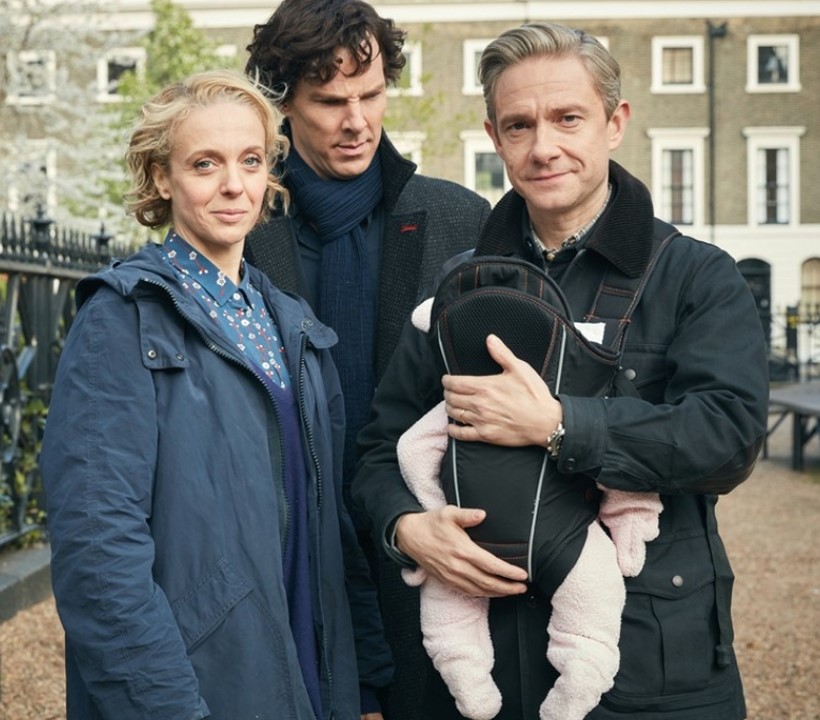Sherlock 4×1 Review: “The Six Thatchers”
Sherlock returns in “The Six Thatchers” with some surprises – but not as many as we expected, and not all of them are the good kind. Also, there is now a baby.
Spoilers should always be expected in our reviews. Just in case you haven’t seen “The Six Thatchers” yet here is your official heads-up that SPOILERS ARE AFOOT. Proceed at your own risk.
This episode picks up directly after Sherlock’s return from exile. (Did anyone think Mycroft would really let his brother be exiled? Neither did we.) He’s been recalled to handle whatever shadowy mystery threat Moriarty left behind. The nature of that threat hangs over the entire episode. Sherlock spends the whole time solving a faceless stream of cases in hopes of finding some trace of Moriarty while ignoring major life events. There’s no sign of the hesitant growth he showed back at John and Mary’s wedding, where he at least acknowledged that he needed to pay more attention to people who matter.
I didn’t find Sherlock’s texting through baby Rosalind’s baptism to be either in character or amusing. I would have expected muttered comments about the bacteria in holy water, maybe snarky commentary on putting religious expectations on an infant, but not utter detachment. He did show baby pictures to Mycroft later, so presumably he’s a little interested in Baby Watson.
There were significant structural problems with the episode, but then we’ve been seeing those through Season 3 as well. I watched several times to confirm there is not a good solid story arc; there isn’t. This episode was four(ish) stories glued together any way they’ll stick, like a broken vase you really need to fix before your parents get home. You get a few random hints and Easter eggs on a second viewing, but I don’t think the foreshadowing of Mary’s death was effective as a unifying theme. That’s a shame when the acting was (as it always is with this cast) so well executed. “The Six Thatchers” is like using Benedict Cumberbatch, Martin Freeman, and Amanda Abbington to act out something from a beginner’s script-writing class. In fact it’s worse, since presumably a teacher might offer some gentle pacing guidance.
“The Six Thatchers” wasn’t all bad. There was a fun bit with a dog, and we saw Sherlock’s trademark brilliance solve cases on next to no evidence. Also, I liked that Mary wasn’t expected to stay home with the baby. John has a moment of, “Wait, I want to go on the case, too,” but he resolves his parenting crisis by taking Rosie along on the chase. During a later scene when Sherlock texts both Watsons for help, they send Mary ahead while John arranges emergency child care. As they agree after a little back and forth, it makes more sense to have the trained spy first as opposed to the doctor. Look at them being all sensible. Go Watsons!
Right after that is where the story loses me.
Sherlock and Mary confront the Primary Episode Villain: a secretary who was using her unobtrusive position to sell state secrets. They do the Big Reveal where all her machinations come to light. (I wasn’t even surprised; as soon as Sherlock asked a random bystander her name at the beginning I said, “Oh hey, that’s the bad guy.” Kindergarten writing, people.) Sherlock takes things a little too far by pointing out the sad, ruined state of her life until – in an attempt to surprise him – she pulls out a gun and shoots. For some reason, Mary jumps in front of Sherlock instead of leg sweeping him or tackling him to the side or doing any number of other things to get them both out of the line of fire. It wasn’t a very big gun. A hit almost anywhere else would not have been fatal, and Mary would have known that.
Of course, Sherlock was always going to kill Mary. She’s dead in the original stories (probably, though it’s never said outright), and Moffat doesn’t exactly have a reputation for handling female characters well in the first place. I struggled with Mary for that exact reason. She seemed a barely-disguised plot tool to split the boys apart, and I found her motivations to be a little contrived more often than not. That doesn’t mean I wanted her killed by a random villain of the week. What a waste of potential. She deserved more.
To be clear, I don’t have a problem with characters dying. When it happens too much that’s a sign of lazy storytelling, but used judiciously it’s a powerful narrative tool. The problem is, nothing was achieved by this character’s death. There was no logical payoff. We’re meant to believe that John now hates Sherlock for “breaking his oath” to protect the Watsons, for somehow causing Mary’s death by taunting the Sinister Secretary. Mary isn’t even afforded the dignity of being given credit for her own death as a choice. She’s just another broken promise from Sherlock, another reason for the detective duo to be mad at each other, and my stomach hurts at the stupidity of it all.
Bottom line: I had a lot of hopes for this season, and it’s not looking good. I’m still watching, but I feel like it’s more out of loyalty to the characters than anticipation of enjoyment at this point. Please, please, please let me be proven wrong with Episode 2.
What did you think of “The Six Thatchers”? Do you agree with me or am I way off? Share your opinions in the comments section below.
Author: Khai
Khai is a writer, anthropologist, and games enthusiast. She is co-editor (alongside Alex DeCampi) of and contributor to “True War Stories”, a comic anthology published by Z2 Comics. When she’s not writing or creating games, Khai likes to run more tabletop RPGs than one person should reasonably juggle.
Help support independent journalism. Subscribe to our Patreon.
Copyright © The Geekiary
Do not copy our content in whole to other websites. If you are reading this anywhere besides TheGeekiary.com, it has been stolen.Read our



